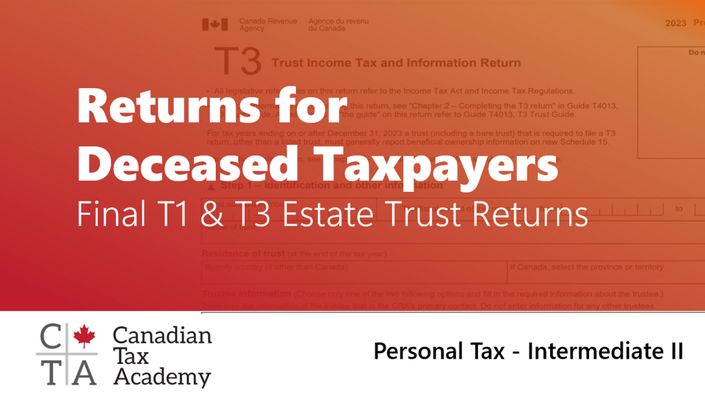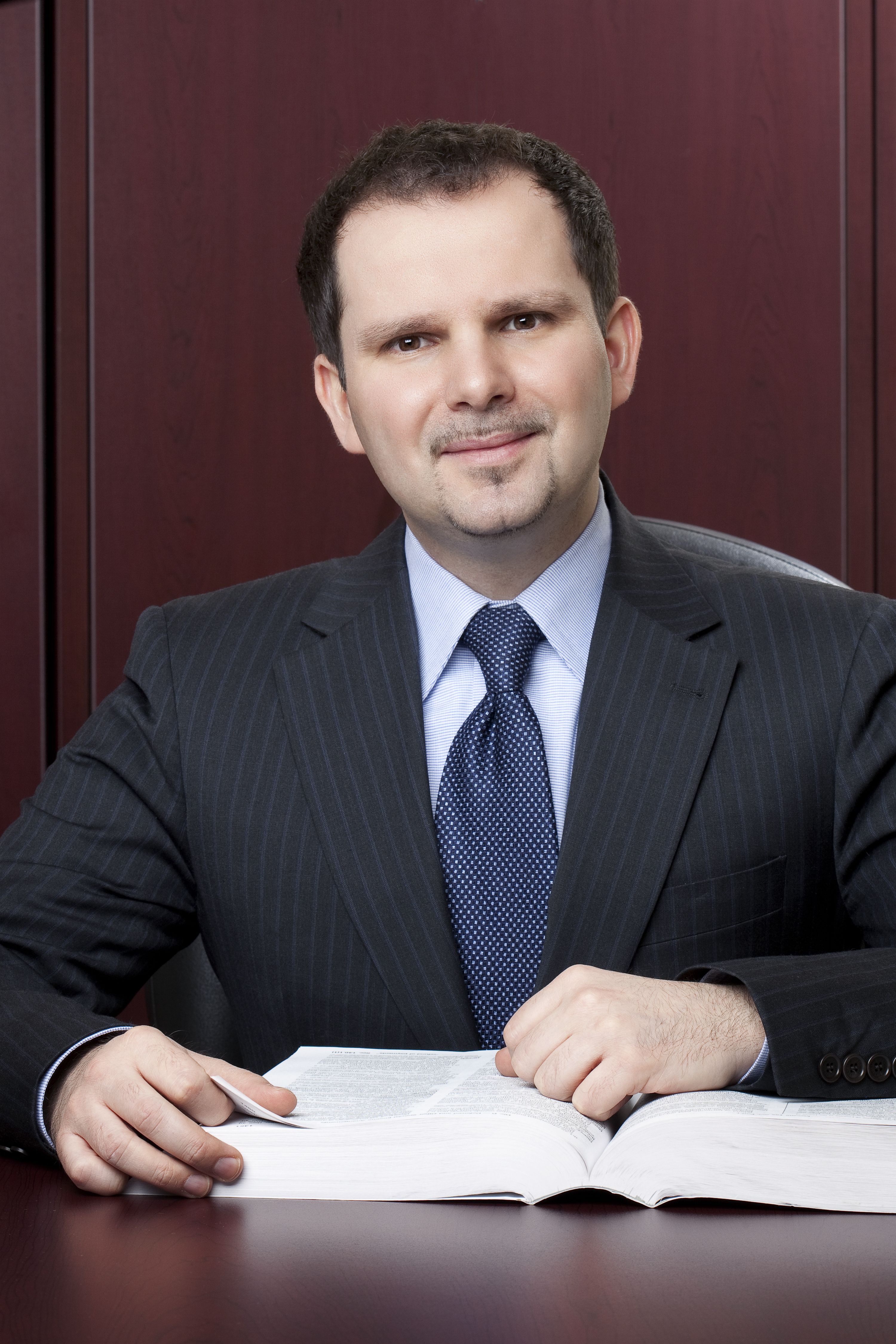
Tax Returns for Deceased Taxpayers
Comprehensive tax course and practical guidance on preparing final tax returns and estate returns - Regular Price $349
EVERGREEN COURSES THAT TEACHES HOW TO PREPARE DECEASED TAX & ESTATE RETURNS REGARDLESS OF THE TAX YEAR
CPD HOURS FOR THIS COURSE - 6 VERIFIABLE HOURS FOR CPA CPD PURPOSES
You probably have heard the old adage … death and taxes. Well, unfortunately when it comes to the death of a Canadian resident taxpayer, truer words couldn’t be spoken.
The death of an individual in Canada gives rise to numerous tax consequences and special filing requirements for not only the deceased, but for their estate as well. Executors are often overwhelmed and confused by the legal and tax landscape they are forced to navigate , especially when they have little or no experience in these matters … which is normally the case.
If you are a tax advisor or planning to become one and have taken the Introductory Tax Course and the Best Practices Tax Course here at the Canadian Tax Academy (or similar industry/tax experience), then this course will provide you with valuable knowledge in your studies and education.
As a tax preparer and advisor, it will only be a matter of time before you are faced with preparing the final tax return for a client. That being the case, you need to be familiar with the technical aspects, rules and deadlines for filing tax returns for the deceased. In addition, you will also be called upon to prepare the necessary tax returns and filings for the estate. This course covers it all.
Once this course is completed, students will be able to:
- Understand the tax implications of the death of an individual and be able to confidently prepare the Terminal T1 tax return and T3 returns for the estate of the deceased
- Consult with clients, executors and other legal representatives on the responsibilities and tax process for the deceased and their estate
- Identify possible tax saving solutions and strategies that can be implemented to save the estate and beneficiaries substantial amounts of tax
This is a comprehensive tax course that not only deals with the technical aspects of the returns, but also goes extensively into the practical side of things and dealing with executors within the overall process and framework. If you are a student of the Canadian Tax Academy, you are familiar with my real-world, practical advice to teaching Canadian Tax. That means that this course contains a wealth of topics and information that you will not find in any other deceased taxpayer course.
The course is divided into 7 modules. Here are a few of the areas covered in the course:
- Taking the 25,000 ft. view to understand the process as a whole as well as the responsibilities for executors, advisors and tax preparers
- Putting together a step-by-step process so that you know how to prepare the returns as well as the special filing deadlines rules for the deceased and their estates
- Properly claiming all the deductions and tax credits available on the deceased’s final tax return (the Terminal T1) and other optional tax returns that are available in the year of death
- Knowing what has to be included in income and trying to minimize the tax implications to better serve your client and the estate beneficiaries
- Dealing with the Canada Revenue Agency (CRA) on tax matters including the process of getting a Clearance Certificate for the executor
This course also deals with the preparation and filing of the T3 Trust & Information Return for testamentary trusts and Graduated Rate Estates that may be necessary for the estate. I take you through the necessary forms and show you examples on how to fill out the form quickly and accurately. We also look at best practices for estate bookkeeping that will save you and the executor lots of headaches and sleepless nights trying to come up with the information necessary for the tax returns.
Preparing tax returns for deceased taxpayers can also be a very lucrative area of practice. I’ll also explain how you can grow your business with quality referrals by focusing or specializing in this specialized area of tax.
As with all the courses here at Canadian Tax Academy, it is evergreen in that the concepts you learn apply to all current and future tax years. I teach you the overall concepts that are applicable to ALL tax years and not just the current year's tax return.
Frequently Asked Questions
Your Instructor

Ian DINovo is a professional accountant and Director of the Canadian Tax Academy. He has been practicing accounting and offering independent financial and business advice for over 20 years.
He is the creator of a number of courses dealing with business, tax and investment matters that are designed to make difficult topics easy to understand for everyone.
Course Curriculum
-
StartOverview of the course and the curriculum we will be covering (4:23)
-
StartEvergreen nature of this course and course questions (5:06)
-
StartAdministration - Course Payments, Refund policy, certificates of completion (6:25)
-
StartDOWNLOAD - Course Notes & PowerPoint Presentation
-
StartWhat happens with someone's taxes when they pass away? (5:03)
-
StartOverview of the process for those in the role of executor (6:38)
-
StartWhat is probate and does a will need to be probated? (4:43)
-
StartOverview of the filing process for tax preparers (5:52)
-
StartThe important dates and tax periods to be aware of for deceased taxpayers (4:08)
-
StartWhat type of time frame can I expect to have executor clear estate (5:05)
-
StartThe different and most common tax returns that can be filed for a deceased individual (5:28)
-
StartOther optional returns for business/partnership income and income from Graduated Rate Estates (GRE) (4:47)
-
StartReturn available when deceased is a beneficiary of an estate (2:49)
-
StartThe deadlines for filing T1 returns for deceased (3:11)
-
StartAdditional T1 deadlines that are often overlooked, missed or not considered (3:44)
-
StartEstate returns and what you need to know (5:07)
-
StartThe deadlines for filing estate tax returns (2:58)
-
StartThe penalties for late filing of trust returns (3:08)
-
StartUsing Auto Fill My Return system to help with returns and easier authorization process (2:58)
-
StartThe Rights & Things return as an optional return (5:04)
-
StartAn example of a rights & things case and what to report (4:32)
-
StartAmounts paid directly to beneficiaries instead of estate (2:10)
-
StartAre instalments necessary after the date of death? (3:23)
-
StartClaiming tax credits in the year of death on the Final T1return (5:02)
-
StartExample of tax credits in year of death - not pro-rated (1:44)
-
StartMedical expense rules in the year of death (4:37)
-
StartRules for donations made by the deceased and by their estate (5:26)
-
StartAccruing income in the year of death and on terminal return (3:53)
-
StartPension splitting with spouse in year of death (3:24)
-
StartWhat happens to capital losses and carry-forwards in the year of death? (4:16)
-
StartWhat happens if there are capital losses in the estate? (3:40)
-
StartAlternative minimum tax (AMT) and the year of death (1:54)
-
StartDealing with T-slips in the year of death on final return and trust return (4:14)
-
StartAnother scenario on dealing with T-slips on the final return (3:08)
